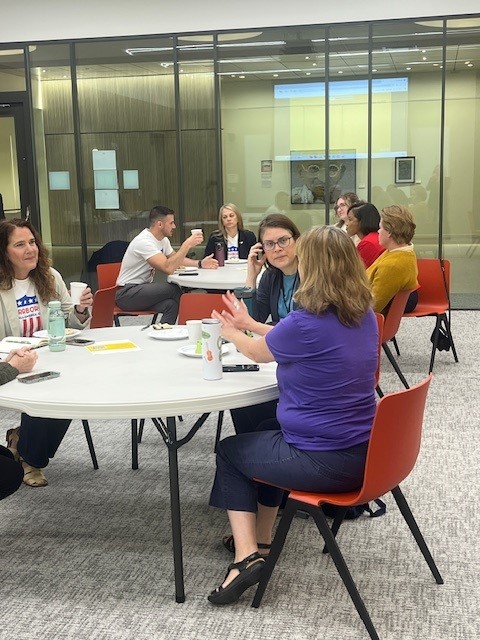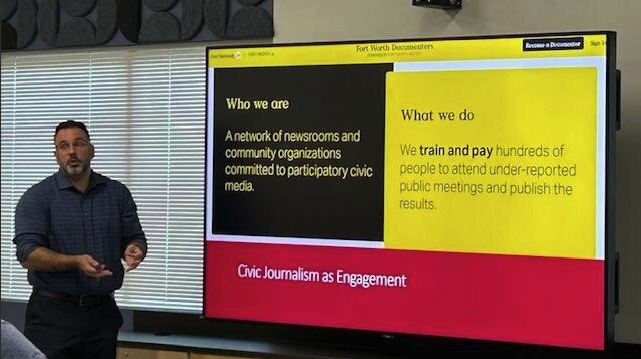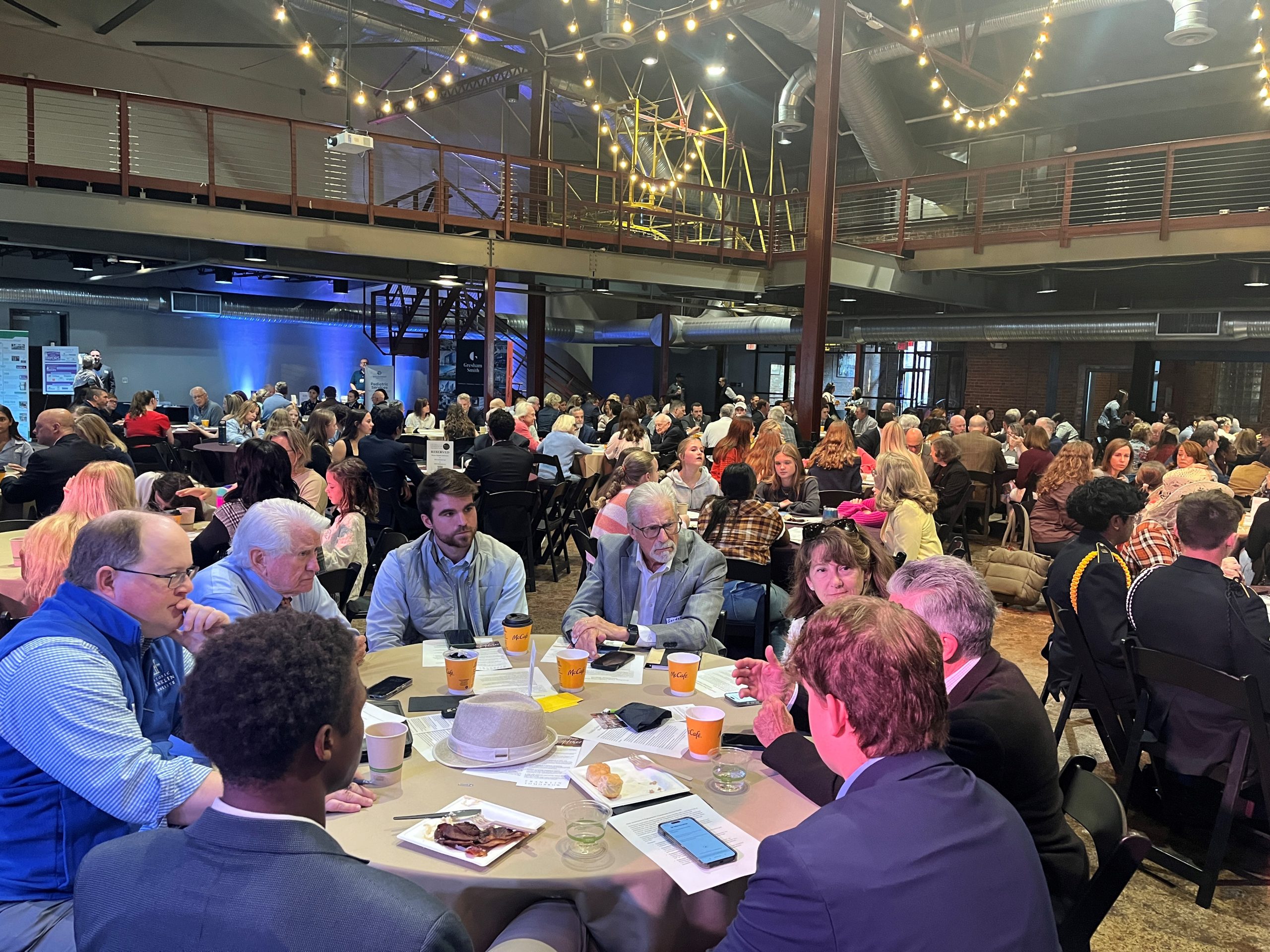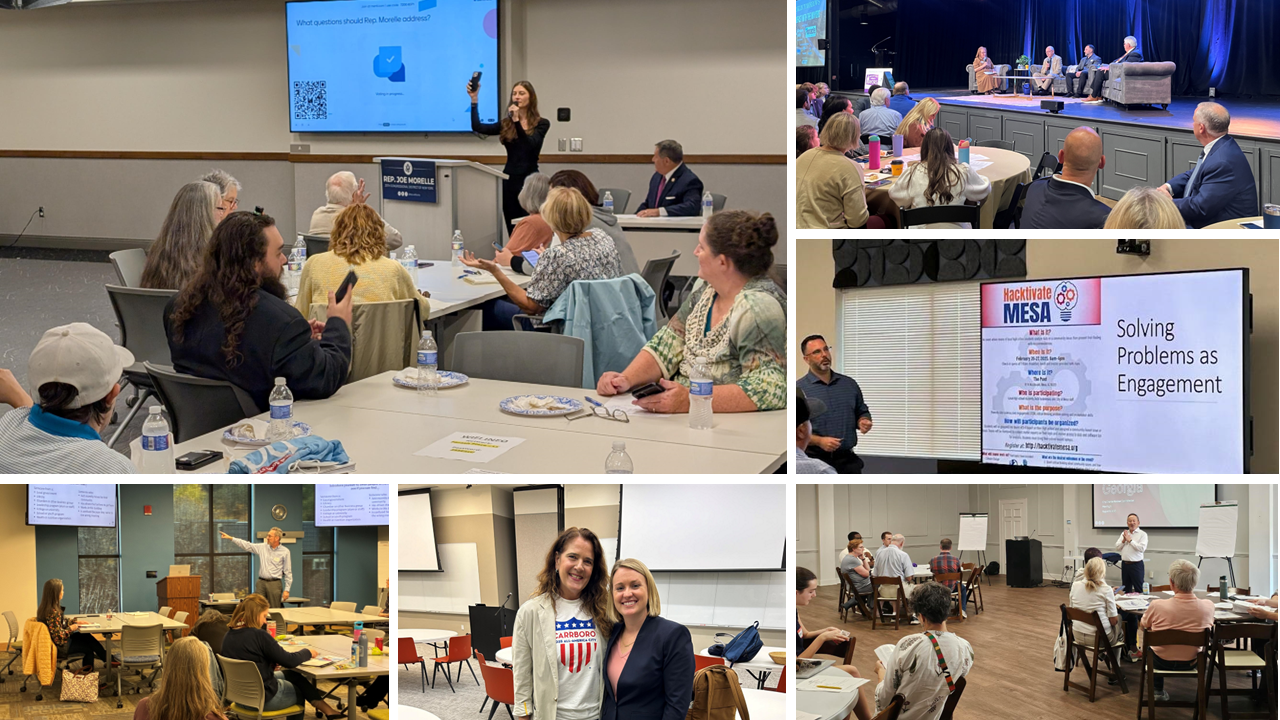In the world of good governance and democracy reform, there’s often a gap between the people who study and promote new tools and practices and those who are doing the hard, messy work of putting them into action locally. The National Civic League sits in a unique position, with one foot in both worlds.
At times, we’ve leaned more toward the theoretical: researching, writing, convening panels, and hosting webinars. All of that matters. But we know it’s not enough. In recent years, thanks to the addition of the Center for Democracy Innovation and Civic Genius, we’ve recommitted to being in communities, allowing us to translate the theoretical into the practical and learning from the realities on the ground.
From the community work spotlighted throughout this newsletter, to an innovations workshop in Carrboro, North Carolina, and the Healthy Democracy efforts in Franklin, Tennessee and Edinburg, Texas, we’re partnering with local leaders and residents to test, learn, and improve. Because strengthening democracy requires both insight and action, and the real magic happens when the two inform each other.
Carrboro, North Carolina
 After celebrating its 2025 All-America City Award at a beloved local music festival, Carrboro kept the momentum going with a democracy innovations workshop. City staff from departments spanning economic development, race and equity, communications, and parks and recreation came together to explore how they could deepen resident engagement in local decision-making.
After celebrating its 2025 All-America City Award at a beloved local music festival, Carrboro kept the momentum going with a democracy innovations workshop. City staff from departments spanning economic development, race and equity, communications, and parks and recreation came together to explore how they could deepen resident engagement in local decision-making.
We began by looking at demographic and societal shifts that are reshaping how communities like Carrboro connect with residents, then discussed a suite of participatory tools—from survey panels and participatory budgeting to citizens’ assemblies. Together, we brainstormed which approaches might best fit Carrboro’s culture and current needs.
The conversation was rich and candid. Staff surfaced on-the-ground challenges—capacity and budget limitations, trust gaps, competing priorities—that often make it difficult to apply these “innovations” exactly as they’re described. I left with a clearer understanding of what it takes to adapt these practices to real contexts, and they left with fresh ideas and frameworks to experiment with. The exchange was a reminder that progress in democracy reform isn’t about perfect models; it’s about iteration to local contexts.
Franklin, TN and Edinburg, TX
Franklin and Edinburg are serving as the first two pilot communities in the Healthy Democracy Project, a partnership between the National Civic League and the Bridge Alliance. Both cities are conducting community research and civic infrastructure scans—mapping the institutions, networks, and relationships that make local democracy work and identifying where those systems can be strengthened.
In Edinburg, my colleagues Nick Vlahos and Derek Okubo have helped convene a Healthy Democracy Cohort made up of local officials, community stakeholders, and residents. The group has met twice—once in person and once virtually—and has established three focus areas:
- Build a volunteer pipeline that includes youth;

- Create or enhance a centralized volunteer portal to connect residents with opportunities; and
- Host a civic fair or summit to showcase community organizations in an engaging way.
In Franklin, a similar process has unfolded through a survey and community forum, and a leadership cohort meeting, all leading up to Breakfast with the Mayors—a citywide conversation that brought together 450 residents, including 60 youth, to discuss the future of civic life. Across these gatherings, three shared priorities have emerged:
- Youth Engagement & Leadership
- Civic Awareness & Engagement
- Community Infrastructure & Public Services
Participants emphasized civic education, mentorship, and volunteering as the cornerstones of a healthy democracy. Young people voiced a desire for meaningful roles in local decision-making—through youth councils, internships, and service opportunities—while residents called for more visible, enjoyable, and accessible ways to get involved. Franklin is now exploring next steps, including a Youth Civic Council, a digital civic hub for volunteering, and expanded partnerships with schools and community leaders.

Across both communities, a common realization has emerged: there’s plenty of civic infrastructure—formal and informal networks that help communities thrive—but the challenge lies in connecting those resources to residents eager to participate. The work ahead is to build those bridges, ensuring that every willing hand finds a place to contribute.
Looking Ahead
Beyond these three communities, the League is advancing similar efforts nationwide. In Raleigh, North Carolina, we’re helping to design a civic assembly, while our Better Public Meetings project continues in Rochester, Minnesota, and soon in Anchorage, Alaska. This same newsletter features stories from our Civic Health workshops across Colorado and It’s Your America events in Covington and Maple Valley, Washington.
If you missed it last month, check out the groundbreaking city charter review process in Decatur, GA and the innovative town hall hosted by Civic Genius in New York’s 25th congressional district. 
It’s long been true that cities are the best laboratories for democracy, and through this work, we’re learning how to reimagine a democracy that is more participatory, equitable, and productive. It looks a little different in each place, but the foundations—more participation and more impact—remain constant.
If you’re interested in working with the League to improve how your community makes decisions and local policy, explore our community solutions or contact us at [email protected].



